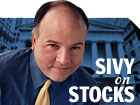|
It's in the pipeline
|
 |
December 17, 2001: 7:38 p.m. ET
Amgen's pricey new acquisition solves some of the company's long-term business problems -- but it doesn't make the stock a bargain.
By Michael Sivy
|
NEW YORK (CNN/Money) - The great promise of biotechnology was that it would enable small innovative companies to crank out one new drug after another, instead of having to rely on the hit-and-miss techniques traditionally used by the pharmaceutical industry. Well, it hasn't worked out that way. Despite enormous scientific advances, biotech firms have just as much trouble developing blockbuster products as old-line drug companies do. In fact, fewer than a dozen biotech companies make any serious money -- and those that do are typically dependent on just one or two big drugs.
No company illustrates both the promise and the limitations of biotechnology better than Amgen does, the largest independent biotech firm. Back when biotech was young, the company discovered how to encourage blood cells to multiply. That led to two blockbuster products -- one for red blood cells that treats anemia for patients on dialysis, and one for white blood cells that helps patients undergoing certain forms of chemotherapy.
The only trouble is that for more than a decade, Amgen has failed to develop a third blockbuster product. Amgen's biggest advance on that front has been a drug for rheumatoid arthritis that is approved for use chiefly when other drugs are found ineffective. The result is that Amgen still gets nearly 90 percent of its sales from its two early successes.
The acquisition of Immunex, announced on Monday, solves a lot of problems for both companies. For starters, Immunex also has too narrow a product base. More than three-quarters of the company's revenues comes from its rheumatoid arthritis drug Enbrel, which currently brings in sales of $750 million a year and could eventually reach as much as $4 billion. By contrast, the market for Amgen's rheumatoid arthritis drug is expected to top out at $500 million.
Acquiring Immunex will give Amgen a billion-dollar-plus position in a third treatment area. It will ensure that Amgen doesn't put up its own also-ran product against the leader in the group. And there's even a kicker. It's possible that some form of combined therapy using both Enbrel and Amgen's own rheumatoid arthritis product could be the best treatment for the most difficult cases.
Amgen's (AMGN: up $3.46 to $59.49, Research, Estimates) earnings should be up about 12 percent this year, compared with historical growth rates of well over 20 percent. Prior to the acquisition, Amgen was projecting that future growth would recover to at least 20 percent. With the acquisition, however, the company says annual growth could top 25 percent by 2005. Not only would Immunex give Amgen three blockbusters instead of two, it would also raise the growth rate and improve the long-term pipeline.
For drug stocks, the pipeline is everything. As companies become larger, it gets harder and harder to keep the pipeline filled with big-money products. And if the pipeline gets depleted, a company ends up like Merck, with its share price getting trampled. Unlike Merck, though, which is currently cheap, Amgen is exceptionally expensive. At $59.50, the stock is trading at 44 times an optimistic projection of next year's earnings. That's more than double the company's core growth rate.
While the acquisition of Immunex will improve the long-term growth rate, it won't be cheap either. Amgen is paying more than 10 times next year's sales, and more than four times what Enbrel is likely to bring in four years from now. Moreover, the acquisition could dilute earnings in 2003 before adding to results in later years.
Does such a high valuation make Amgen's stock a bad buy? Not necessarily. If you were putting together a biotech index fund or a portfolio of top growth stocks, Amgen is virtually a required holding. But personally, I wouldn't buy the stock here. Mergers usually hit rough spots, fail to deliver promised cost reductions on time or get dragged down in some general market pullback. I'd be inclined to wait and watch how the merger progresses -- and hope I get a chance to buy at a significantly cheaper price.
Sign up to receive Sivy on Stocks by e-mail every Monday, Wednesday and Friday. 
|
|
|
|
|
|

|

